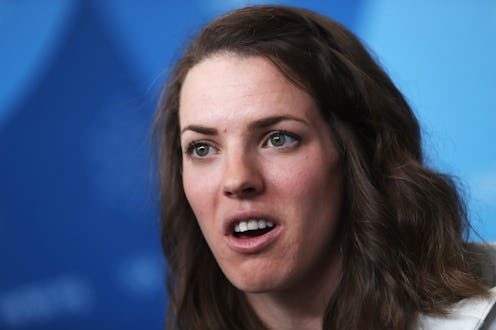News
This Ski Jumper Sacrificed So Much To Get To The Olympics & She Has Just One Request

As Abby Ringquist watched Team USA's all-male ski jumping squad fly through the air at the 2006 Winter Olympics, she asked herself: Why don't girls get to do that? Fast forward 12 years, and the 28-year-old was competing in the only women's ski jumping event of the 2018 Winter Olympics, while male skiers jumped in four separate events. Despite finally achieving her childhood dream of becoming an Olympian, Ringquist's fight for equality in Olympic ski jumping is just getting started.
She finds the unequal number of ski jumping events for men and women infuriating. "I think they’re mostly just afraid a woman can jump farther than a man in a male-dominated sport," Ringquist tells Bustle.
The 2018 PyeongChang Games were the second Olympics to include women's ski jumping, after a group of women sued for women skiers' right to compete in the 2010 Vancouver Games. Those skiers lost the suit, but the International Olympic Committee (IOC) did offer women the chance to participate in one ski jumping event at the 2014 Sochi Games. Women competed in the normal hill in PyeongChang, while men jumped in the normal hill, the large hill, the team event, and the Nordic combined (a mixture of ski jumping and cross-country skiing).
The IOC did not immediately respond Wednesday to Bustle's request for comment. The IOC's vice president, Anita DeFrantz, recently told NBC "It was all men who made the decision. And sadly, that continues in some sports. And it's just time for them, if not the women in the sport, to say 'OK, time's up. We can do this.'"
Ringquist is doing exactly that. She fell in love with ski jumping in first grade; it was the sport her older brother chose to do, and she didn't mind jumping with the boys. When the Winter Olympics came to Salt Lake City in 2002, she attended all the jumping competitions. "I always idealized the men because that's all that I knew," she says. "I just wanted to be like them."
When the IOC announced in 2011 that it would finally add the women's normal hill event to the 2014 Winter Olympics, Ringquist was 21 years old —and she still desperately wanted to go to the Olympics. "It gave us the sense that our dream was actually within reach," she says. "It was really cool to actually say that I was an Olympic hopeful, whereas before we couldn’t say that." When she completed her first Olympic trial competition in PyeongChang last week, Ringquist couldn't stop smiling the whole day as she thought, it's finally happening.
She ultimately didn't medal, but the notion of how far women in her sport have come in the past decade wasn't lost on Ringquist. Women ski jumpers can finally compete in the Olympics; competition between them is getting fierce; and women are jumping farther than ever. But one of the eight original Winter Olympic sports still doesn't treat men and women equally, and that deeply frustrates Ringquist.
Before they even get to the Olympics, women face unique challenges while training and competing. Across the board, women athletes receive less funding and lower pay than their male counterparts. When it comes to ski jumping, the International Ski Federation's rules allow the World Cup's first place male jumper to rake in more than three times what the first-place woman wins, according to The Chicago Tribune.
"All my money was going toward training, and I couldn't even help [my husband] pay the bills, which is hard when you’re an adult."
It's also tough for women to get adequate sponsorship. As The Economist points out, sponsors want to finance athletes who get a lot of exposure, and few female athletes do. Ringquist worked three jobs while training for the Olympics before she got involved with the 1,000 Dreams Fund, a nonprofit that grants scholarships for young women to pursue their dreams.
"I'm married and have a mortgage," she explains. "All my money was going toward training, and I couldn't even help him pay the bills, which is hard when you’re an adult."
Ringquist decided earlier this month that her first Olympics would be her last, in part because of the financial struggles she faced. She continues speaking out about the gender inequality in ski jumping in the hopes that women's prospects in the sport will improve, though. She believes that with time, and with increased awareness, women will eventually compete in the same number of Olympic ski jumping events as men.
"I think they’re mostly just afraid a woman can jump farther than a man in a male-dominated sport."
Just last fall, USA Nordic Sport, the previously all-male national ski jumping and nordic combined team, joined forces with USA women’s ski jumping to creating a more integrated community of jumpers. "For years we were separate entities, and now we’re finally one," Ringquist says. "Hopefully it will snowball."
As for the people who don't think women skiers can handle larger jumps and the pressure of competing in more Olympic events, Ringquist thinks she and her competitors already have shown that they're just as good as the boys. "All we can do is jump well and prove them wrong," she says.